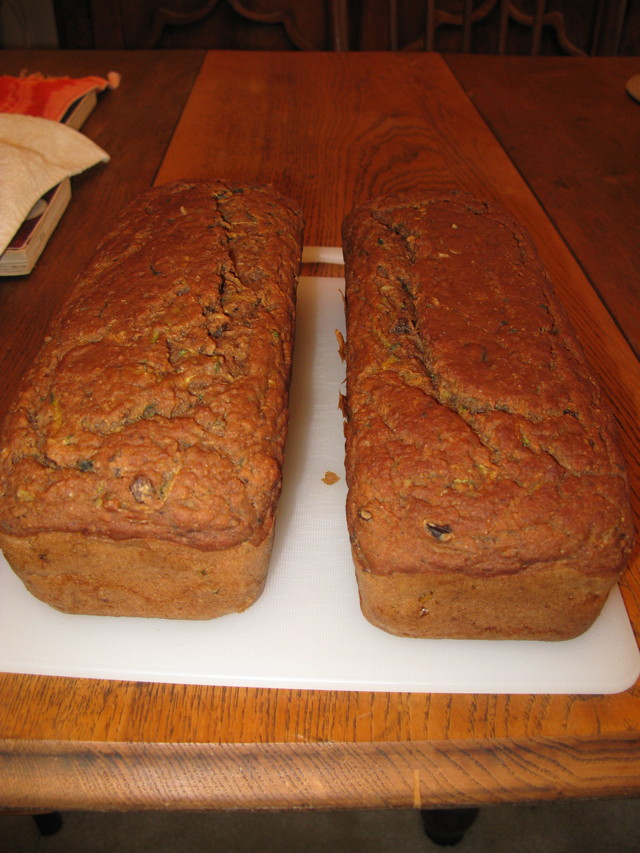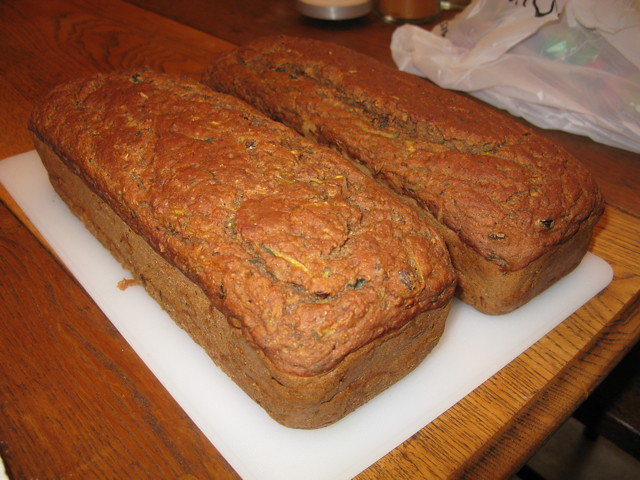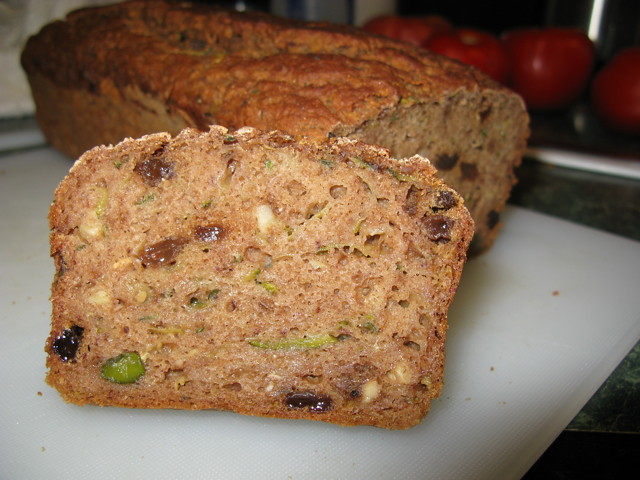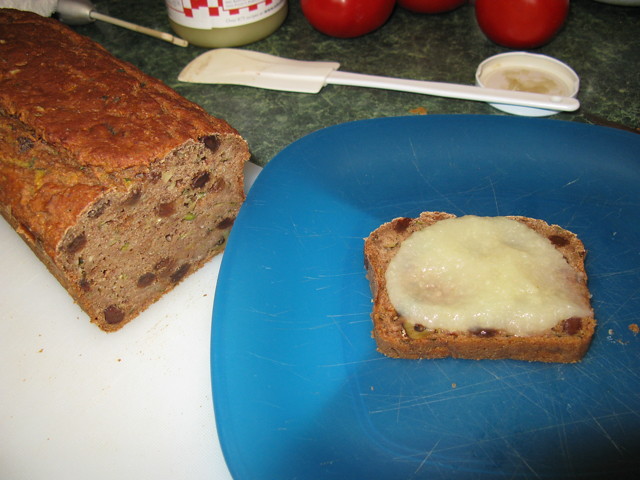But I tweaked it a bit myself as a test. I cut the sugar in half, some of which was using up some date sugar I had. I also made it with no oil at all. In her recipe, Jennifer suggests cutting the oil in half and substituting organic apple sauce for the other half of the oil which I did the first time I made it. But having read a refresher on Dr. Caldwell Esselstyn's no oil lifestyle this weekend, I decided to use all applesauce and no oil at all. And to my (admittedly unsophisticated) palate, it tasted great—the same as the previous batch I made using half oil and half applesauce.
Re: no oil. On June 23, I posted a reference to a post on the "Happy, Healthy Long Life" blog which contains the notes from a recent orientation class by Dr. Esselstyn for a group of heart patients entering his "prevent and reverse heart disease" lifestyle program—which allows no oil for those with heart disease—nor any oil-containing whole foods (nuts, avocados, etc.). You can read the notes from that class to get the reasoning.
I've gotten religious about cutting back on oil in the last year or so because of Dr. Esselstyn's (and others') view that men who have eaten the Standard American Diet consistently, and are now 65 years-old or older, have heart disease to one degree or another. Since I am now 62.5, and ate the Standard American diet until I was 52 (vegan since then), that puts me close to the suspect category. But even as a vegan I consumed copious quantities (off and on) of "heart healthy" oils like extra-virgin olive and hemp. The problem is that "heart healthy" is a misnomer—it should be "heart healthier." Those oils are healthier than canola and other refined vegetable oils, but not by much because of the damage they do to the lining (endothelial cells) of arteries—according to Dr. Esselstyn and others like Dr. Dean Ornish.
Today, the Happy, Healthy Long Life blog (written by a medical research librarian) posted another must-read post in which she paraphrases Dr. Esselstyn's summary of people who criticize his no-oil position, and his response:
"When people tell me my diet's extreme, or too strict, I ask them, 'How would you like to spend your last years in a nursing home, sitting in a wheelchair, incontinent, immobile, unaware, with saliva dribbling out of the side of your mouth?'"
Of course, not everyone who consumes oil is going to end up like that. His point was that ill-health is the result of long-term abuse of the body. The same thing that abuses arteries that leads to heart attacks abuses arteries in the rest of the body—namely, the brain, leading to strokes (and the male penis, leading to erectile disfunction. ED is a warning sign for a heart crisis waiting to happen). The post of the Happy,Health Long Life blog is a tragic story of several people, including the author's father, who spent the last years of their lives wasting away due to strokes and other debilitating conditions—exactly the scenario hypothesized by Dr. Esselstyn in the quote above.
Having had two parents who died of chronic diseases—one lingering for more than a decade after the quality of her life had fallen to near zero—I decided 10 years ago to try to learn what I could about staying healthy, which led to my vegan, mostly-raw diet. Now that I'm firmly committed to the preventive part, the no-oil (and other) protocols are part of the "repair" part—doing what I can to give my self-healing body every opportunity to make up for damage previously done. I'm not doing it perfectly, but want to keep expanding my horizons as much as possible. The more I learn, the more I realize just how processed our food has become—even "organic, vegan" food—and why eating out of one's own garden (or local farmer's market) is the best way to eat.
At the weekly men's Bible study I attend at my church, I listened this past Tuesday night to a man I've come to know and admire (an elder in our church, around my age I think), describe the angina attack he had suffered the week before, resulting in the placement of three stents in his arteries. (27,000 deaths occur annually from bypass and stent procedures.) I came home and wrote him a long email outlining some things I hoped he would read and consider looking into to help "reverse" his heart disease. His return reply was gracious, but not indicative of someone who is "desperate" not to have heart disease. In my Sunday school class this morning I heard another couple ask prayer for their adult daughter who has been battling breast cancer and just discovered she now has colon cancer. I'm going to try to send them materials to consider—evidence that shows these cancers can often be reversed by a change in diet. I hope they'll be interested enough to follow through and begin investigating these protocols. When a good friend of mine from high school discovered he had a rare, aggressive cancer two years ago, he and his wife immediately began a juicing regimen and change in diet which resulted in reports within a week of how much better he felt. But his oncologist shut down the juicing for fear of getting "germs" in the raw juices that his immune system, weakened and ultimately destroyed by chemo, would not be able to fight off. I flew to Dallas a couple months later to help lead his funeral service.
I'm trying to get a handle on why desperately ill people won't listen to counsel about the power of diet to either destroy or heal the body. Is this, like one's response to the Christian Gospel message, a spiritual issue since it deals with God's truth (Genesis 1:29)? Or is it because people are so conditioned by conventional medical practices that if they don't hear it from their doctor they simply won't put any stock in it? (And very few doctors will admit to diet having ANY impact on the cause or reversing of disease.) Perhaps it's both. Again, since I don't do this perfectly, occasionally eating (vegan) things I know aren't "best," perhaps it's our emotional link to the foods we have become accustomed to that mitigates against chance.
All that to say, the zucchini bread I made today, while definitely not raw, is proof that wonderful foods can be made with no oil, no salt, and little sweetener and still be awesome to eat. Here are the two LONG loaves I made (using unusual shaped long, narrow pans I bought at Ikea. Is this size a Scandinavian thing?):
The dark spots are raisins, the green flecks are zucchini, and the beige specks are walnuts (Dr. Esselstyn allows some walnuts for patients not in a heart crisis due to their Omega-3 strength):
A piece (okay, a couple) of this warm bread with some organic applesauce makes a sleep-good snack:









Hey, William..."Yum"...now that looks like my kind of bread!
ReplyDeleteI will have to try it with applesauce. I've heard about using applesauce in recipes, but never tried it.
ReplyDeleteThis year we should have a lot of apples, unlike last year, we had not a single one. I hope to make applesauce soon. Yesterday I put zucchini on pizza and it was really good.
Can't wait to try Jennifer's recipe, but use all applesauce instead of 1/2.
Just a note, Lisa -- if you try the recipe, it would make one of the two loaves I pictured since I doubled Jen's recipe. The pans I used are unusually longer and a bit thinner than regular loaf pans, so you might get a shorter but wider loaf. Anyway, just wanted you to know I doubled the recipe to get the two loaves pictured. Good luck with the apples!
ReplyDelete